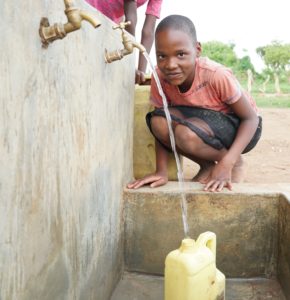
“Water, water everywhere and not a drop to drink.”
Perhaps nowhere is this classic paradox more true than in Uganda, with its abundant precipitation falling upon a country where 61% of the people still lack access to safe water.
This lack of clean water access has major implications for education, where water and sanitation-related illnesses such as diarrhea, cholera, and skin and eye infections result in days lost from school and even dropouts. In Ugandan schools particularly, clean drinking water is a luxury, as 67% of schools still do not have adequate sanitation facilities such as toilets.
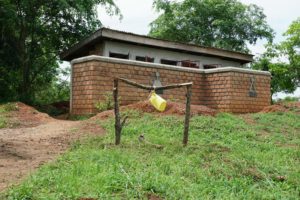
Gender-segregated latrines at the BT Primary School of Kyeshande, with a “Tippy Tap” (a hand washing station made with locally available materials) in the foreground
Beyond the immediate effects upon community health and dropouts, however, are the dire ramifications that poor access to water has on Uganda’s development and breaking the persistent cycle of poverty. Almost half of the population is under the age of 15 years, and this lack of critical water and sanitation infrastructure at schools means that children are not only exposed to health risks, but are also deprived of a learning environment that teaches and trains them to cultivate healthy water and sanitation practices, like hand washing.
Building Tomorrow recognizes these challenges and has seen the impacts that proper water, sanitation, and hygiene (WASH) facilities have upon educational access and quality. We have witnessed first-hand the difference that having this basic infrastructure on school grounds makes in increasing attendance rates, decreasing absences, and improving performance at school.
Therefore, beyond a commitment to building enough gender-segregated latrines in line with WASH best practices at each of our schools, we have also partnered with the Ugandan Water Project since 2017 to harvest and deliver safe and clean water.
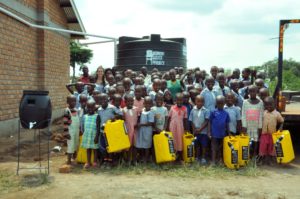
Students at the BT Primary School of Bulyamushenyi in Nakaseke District show off their new WASH hardware.
Part of the solution involves harvesting rainwater through the installation of two 10,000 Liter (2,600 Gallon) water tanks at each of our schools. Because Uganda receives about 80 inches of rainfall each year, this rainwater collection system is a practical method for procuring clean water. Moreover, the systems are long-lasting, with a lifespan of at least 30 years, and each tank provides clean drinking water to about 500 students, or 100 families at any given time. On a market level, they support the local economy, as the systems are locally manufactured.
![]()
But we don’t stop there. Thanks to innovations and advancements in water purification technology, we are also able to procure, through our partnership, point-source filters called Sawyer filters for school children. The Saywer filters eliminate the harmful bacteria and pathogens responsible for illnesses such as cholera, dysentery, and diarrhea and, used in conjunction with rainwater collection systems, are delivering an incredible standard of water purity previously unavailable at school and even the wider communities. The filters, which are just $75, last up to 10 years and can filter as many as 1 million gallons of water in their lifetime.
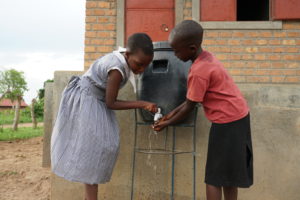
Girls at the BT Primary School of Bulyamushenyi wash their hands after playing an intense game of soccer.
Lastly, when supplies permit, the Ugandan Water Project provides two hand washing stands for each school, which are placed outside key places like latrines and kitchen areas to habituate students to the habit of maintaining good hygiene and health.
In partnership with the Ugandan Water Project, we have already established such systems at 8 of our schools across 5 districts since 2017, including the Building Tomorrow Primary Schools of Bulyamushenyi, Butiti, Degeya, Kabuyanda, Kyantamba, Kyeshande, Runyana, and Rwemirondo, with plans to begin installation at Bulemezi and Kamukanga this month.
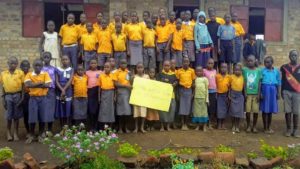
At the BT Primary School of Rwebishahi, Fellow Paul Kisaakye and the student-led WASH Club ensure pupils always have access to clean water for hand washing behind the school latrines and in the kitchen, as well as safe water for drinking. The students even organize clean-up campaigns around the school and community, alongside hygiene check parades, to make sure their classmates are adopting good hygienic practices.
Building Tomorrow’s Thriving Schools Program, which trains and deploys Ugandan college graduates as Fellows, builds upon this infrastructural investment by delivering important complementary interventions, such as fully integrated life skills education, focusing on key hygiene behaviors for school going children and using participatory teaching techniques, outreach to families in the wider community, and the creation of improvised hand-washing stations using local materials called “Tippy Taps” in places where such infrastructural investments have not yet reached. The formation of student-led “WASH Clubs,” for example, encourages children to take the lead on promoting healthy behaviors in their schools and communities, and are already present at 25 of our Building Tomorrow schools.
This Thriving Schools Program aims to ensure all children have access to an inclusive quality education, and a safe and healthy learning environment is paramount in its objectives.
That’s why clean water is one of the most important school supplies which we are working hard to promote through our partnership with the Ugandan Water Project. Through rainwater harvesting and other innovative technologies that capitalize on nature’s wealth, we are using water to grow one of Uganda’s greatest resources—its children.

Follow Us on Social Media